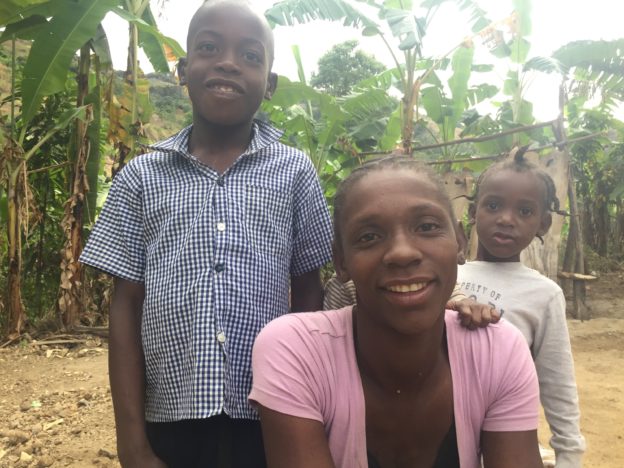Marie Yolène is, like the others who are part of the Kolonbyè cohort, about six months into her experience of the program. When I ask her whether she feels as though her life has begun to change she hides her face in her lap in embarrassment. Though she had welcomed cheerfully into her yard, this question somehow puts her off her guard.
But she eventually started recounting changes that she’s experienced so far. Her oldest boy is in school this year, and she’s started to learn how to write her name, too. She does so by copying in a notebook from an example her case manager gives her. She hasn’t begun working on Yolène yet, but she writes “Marie” clearly. Though she’s left-handed and is more comfortable writing it backwards from right to left, starting with the E.
Her new home’s frame is up, but she’s not sure yet how she and her husband will afford the palm trees they’ll need to build up its walls. Her goats and pig are pregnant. Only one of the goats is close to giving birth, but she’s started imagining what she’ll be able to do if she can raise their young. “Ou ka achte yon bèf oubyen yon ti kal tè si w jwenn yon. E w ka jere depans lekòl.”
That means, “You can buy a cow or a little piece of land if you can find one. And you can manage school expenses.” And it shows that she doesn’t really have a plan yet, just a series of hopes.
Like other poor families in Kolonbyè, she and her husband have really had to struggle because of the failure of their most recent harvests. They got nothing from either their pigeon peas or their millet, and the two would normally be their most important crops. Her husband is keeping the family more-or-less fed by working in neighbors’ fields. It’s called “vann jounen,” or “selling a day,” and it usually brings in just 50 gourds, which is now worth only about 75 cents. She supplements what he can bring in with money from her weekly stipend. She avoids spending everything that the two bring in, but the stipend will run out in February, and she’s not sure what she will do then.
